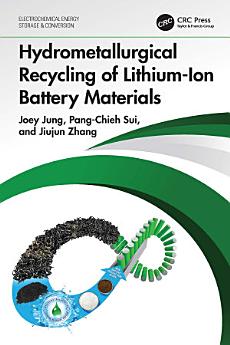Hydrometallurgical Recycling of Lithium-Ion Battery Materials
À propos de cet e-book
Key Features
• Summarizes current recycling processes, challenges, and perspectives
• Offers a comprehensive review of current commercialized LIB recycling companies
• Showcases an innovative closed-loop hydrometallurgical recycling process to recycle lithium cathode materials
• Provides detailed modeling and economic analyses of several hydrometallurgical recycling processes
• Features practical cases and data developed by the authors
Offering the most up-to-date information on LIB material recycling, this book is aimed at researchers and professionals in materials, chemical, electrical, and mechanical engineering, as well as chemists working on battery technologies.
À propos de l'auteur
Dr. Joey Jung is the Vice President Operations of Kemetco Research Inc. and co-founder and treasurer of the International Academy of Electrochemical Energy Science (IAOEES). Dr. Jung was appointed as the Director of Hydrogen & Fuel Cell Research Center at the Institute for Sustainable Energy, Shanghai University from 2018 to 2022. Dr. Jung has more than 20 years of R&D experience in the subject areas of fuel cell catalysts, fuel cell gas diffusion layers, high surface area carbon foam and carbon paper, leadacid batteries, lithium-ion batteries, metal-air batteries, electroplating/electrowinning, electroreduction of carbon dioxide, lithium extraction and processing, and lithium-ion battery recycling. Dr. Jung has edited and coauthored two books, three book chapters, over 20 publications, and more than 20 US/EU/JP/CA/CN patents, and he has been involved in over 130 industrial projects. Dr. Jung coedited the book Lead-Acid Battery Technologies: Fundamentals, Materials, and Applications, published in 2015 by CRC Press.
Professor Pang-Chieh Sui currently holds dual appointments at the Wuhan University of Technology (WUT, from 2016) and Tsinghua-Sichuan Energy Internet Research Institute (EIRI, 2018). Before joining the WUT/EIRI, he was a Senior Researcher and Tech Lab Manager of the Institute for Integrated Energy Systems, University of Victoria (Canada) during 2003–2015, and a Research Scientist at the National Advanced Driving Simulator (USA) during 1997–2003. Prof. Sui received a Bachelor’s degree from National Tsing Hua University (Taiwan) in 1986 and an MS and a Ph.D. from the University of Iowa, USA, in 1992 and 1997, respectively. He is a recipient of the Hanse-Wissenschaftskolleg Fellowship of Germany (2015), the 6th Hubei National Telent Plan Award (2016), the Sichuan-1000 Plan (2019), and the Overseas, Hong Kong & Macao Scholars Collaborated Researching Fund of China (2014).
Professor Jiujun Zhang is the Dean of Fuzhou University College of Materials Sciences and Engineering and Dean of Shanghai University Institute for Sustainable Energy/College of Sciences. He is a former Principal Research Officer at the National Research Council of Canada (NRC), Fellow of the Academy of Science of the Royal Society of Canada (FRSC-CA), Fellow of the International Society of Electrochemistry (FISE), Fellow of the Engineering Institute of Canada (FEIC), Fellow of the Canadian Academy of Engineering (FCAE), Fellow of the Royal Society of Chemistry (FRSC-UK), and the Founder/Chairman of The International Academy of Electrochemical Energy Science (IAOEES). From 2014 to 2022, Prof. Zhang was ranked in the top 1% of Highly Cited Researchers in the world and has also been listed as one of the “3000 World’s Most Influential Scientific Minds” by Thomson Reuters in 2014–2016. Dr. Zhang has more than 750 publications with approximately 63000 citations with an h-index of 103, including 550 refereed journal papers, 28 edited /co-authored books, 43 book chapters, 220 conference keynotes, and invited oral presentations, as well as over 16 US/EU/WO/JP/CA patents, and produced more than 90 industrial technical reports. Dr. Zhang serves as the Editor-in-Chief of Electrochemical Energy Reviews (Springer Nature), Associate Editor of Green Energy & Environment (KeAi), and the Editor/Editorial Board member for several international journals as well as Editor for the book series Electrochemical Energy Storage and Conversion (CRC Press).





